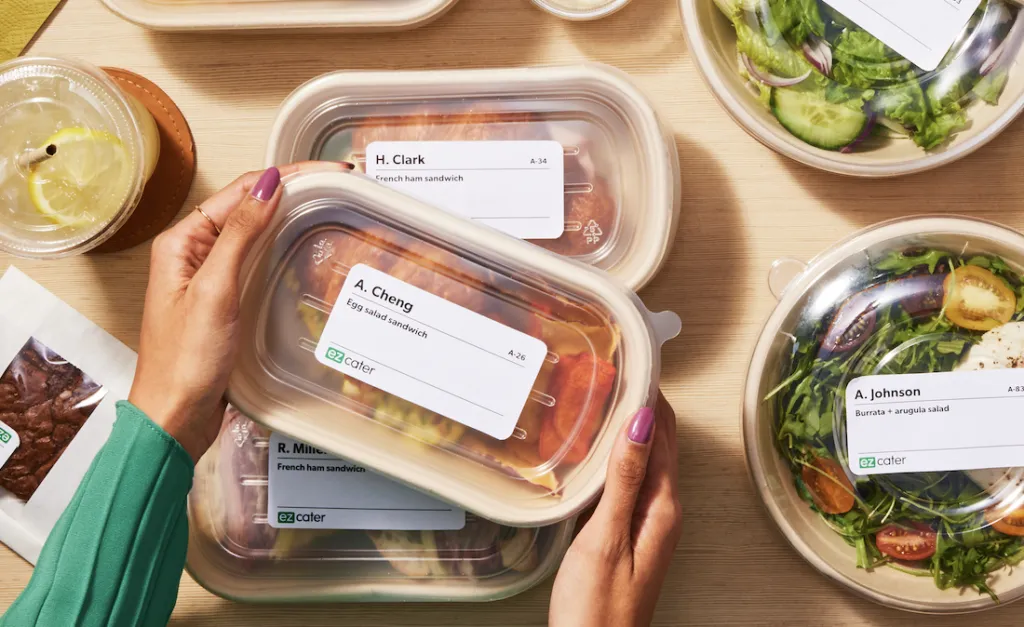Food allergies are on the rise. In 2021, the Food and Drug Administration (FDA) revised its list of eight common allergens to include a ninth one: sesame. Now, more than 50 million Americans live with a food allergy — and that likely includes some of your employees.
Workplace food allergies are a big deal. Fostering a safe, welcoming, and healthy environment means you must take precautions to ensure employees don’t come into contact with deadly allergens. No pressure, right?
Yes, managing food allergies and dietary preferences in the workplace can be challenging. But these tips will help you tackle this crucial task to keep employees safe and happy.

Conduct an allergy survey at work
The first step to accommodating food allergies at work is understanding how many employees have food allergies, and what they’re allergic to. A survey (whether in an email or paper form) sent to new hires and existing employees will help you find that out.
Start by making a list of the nine most common food allergens:
- Milk
- Eggs
- Fish
- Shellfish
- Tree nuts
- Peanuts
- Wheat
- Soy
- Sesame
Include boxes so employees can check off their allergies. Be sure to leave a blank space for additional comments in case an employee has an allergy not on that list.
You may restrict the survey to only include food allergies or create a separate section for dietary restrictions. They are not the same, but it could be helpful to track both.
Follow the law and keep confidentiality
Food allergies are covered under the Americans with Disabilities Act (ADA). Thus, when you ask employees about allergies, you have to keep their medical information private.
Make it clear on the survey that all answers will remain confidential within human resources. Reinforce that you’re only asking so you can offer reasonable accommodations for dietary requirements.

3 ways to implement an allergy-friendly company food policy
Once your survey results are in, it’s time to start managing food allergies in the workplace. For employees with allergies, seemingly benign parts of company culture (like sharing a lunch or attending a potluck) can be life-threatening. Updating the company food policy and explaining the changes to everyone at the office can make those with allergies feel more at ease.

1. Create allergen-free areas
Cross-contamination doesn’t often happen in workplace lunchrooms, but when it does happen, it can trigger a severe anaphylaxis episode. Even something as innocuous as poorly washed dishes and silverware could trigger a reaction. Avoid health risks by creating safe eating rooms where allergens will never enter, like a separate lunch area if your office has the space for it.
2. Say yes to lunching at the desk
Employees with food allergies at work may feel safer eating at their own desks, especially if you can’t designate an allergen-free space. They may not want to be around coworkers enjoying an allergen-loaded meal, just to be cautious. It might go against your good ideas of fostering a lively work environment, but at the end of the day, the best workplace is one that feels safe and inclusive.
3. Ban allergen foods
If creating allergen-free zones and green-lighting desk lunches isn’t an option, consider banning those allergens altogether. This may not be easy, nor a popular measure, so be sure to have an open conversation with all employees. Remind them of the basics of food allergies, how dangerous anaphylaxis is, and what kinds of foods won’t be tolerated in the workplace going forward.
Remember to keep your employees’ medical information private during these announcements. You should never disclose who is allergic to what.
Be mindful of catered meals
Ordering catering is a great idea: you can boost team morale, improve performance, and increase productivity. But now that you’re accommodating employees with food allergies at work, it’s not as simple as ordering whatever sounds good, waiting for the delivery, and digging in.

Order from allergy-free vendors
Get familiar with common food allergies and dietary restrictions so you understand what foods are off-limits. Then look for local restaurants offering an allergen-free menu.
This is where a service like ezCater comes in handy: you can view the catering menus of 100,000 restaurants in one place, without having to bounce from website to website until you find something that works for your team.
To be safe, contact the restaurant to let them know you have someone with a food allergy in your party. They should use different cooking and prepping tools and utensils to avoid cross-contamination.
Offer substantial alternatives
If your company is doing happy hour with local craft beers, offering water to employees with a gluten allergy isn’t a great move. Sure, it won’t trigger you, but they might feel left out. Instead, order a gluten-free beer or a glass of wine. Alternatives that are similar make everyone feel included.
Label everything on the table
Buffet tables can be a way to address food sensitivities at office events, but only if you clearly list potential allergens in each dish. This way, employees can pick and choose what they eat with ease.
Don’t forget to provide a different serving spoon for each dish to avoid cross-contamination. And to be extra safe, place the allergen foods on a separate table, so there are no accidental mix-ups.
Stay positive and open to feedback
Workplace food allergies can be a sensitive subject. For those with dietary restrictions, something as simple and pleasant as sharing a meal with coworkers is often a source of stress and worry. And they may even feel like a burden or hassle to deal with at meal times.
Instead of showing frustration, take this as an opportunity to make the workplace more inclusive. Allow employees to make suggestions and ask them what’s working, and what could be fixed. It not only makes employees feel valued, but it also makes your job of managing food allergies in the workplace easier.
Embrace an easier way to handle food allergies at work
When you’re ready to cater to a crowd at work, ezCater has your team’s dietary needs covered. Whether you’re hosting a buffet-style meal or celebrating a team achievement with individually packaged meals, you’ll find dozens of allergen-free options from local eateries on the platform. Leave specific allergy-related instructions on your order and let the restaurant do the rest. Once it’s delivered, your employees can just dig in knowing they’re about to enjoy a safe and delicious feast.








